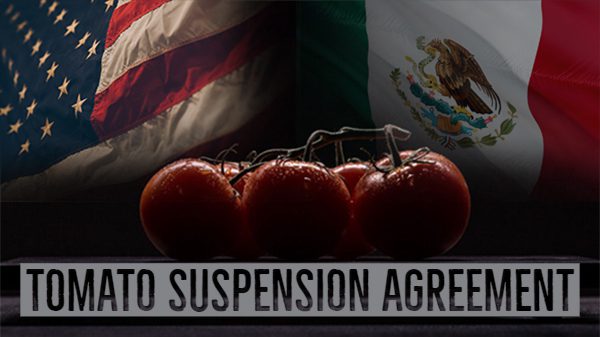The U.S. Department of Commerce terminated the 2013 suspension agreement on Mexican tomatoes May 7, meaning all fresh tomatoes from Mexico will now have a 17.5 percent duty.
However, it announced that negotiations will continue toward a revised agreement with Mexican growers.
Lance Jungmeyer, president and CEO of the Fresh Produce Association of the Americas said May 7 that his group is advising members to be ready to pay the duties and set up the proper paperwork.
“The good news it that it says they’re willing to negotiate,” he said.
Jungmeyer said he didn’t know what Mexican grower group proposed most recently, as it hasn’t been publicly released.
“The Department of Commerce remains committed to ensuring that American domestic industries are protected from unfair trading practices,” said Secretary of Commerce Wilbur Ross in the May 7 announcement. “We remain optimistic that there will be a negotiated solution.”
Tomato buyers will see the duty imposed on all Mexican tomatoes starting May 8.
The FPAA said in a press release it’s disappointed in the announcement, and it expects tomato prices to rise for consumers.
According to USDA’s Agricultural Marketing Service, a 25-pound carton of vine-ripe tomatoes from Mexico were $13-14 at the New York terminal market, the same price as mature green tomato 25-pound cartons from Florida, May 7.
The Commerce Department said in its announcement, “Termination of the Agreement will result in the continuation of the suspended investigation. Commerce will continue with its investigation and notify the International Trade Commission of its final determination. If Commerce continues to find sales made at less than fair value in its final determination, the ITC will then complete its own investigation and make a final determination with respect to injury. If both Commerce and the ITC issue affirmative final determinations, an antidumping duty order will be issued.”
Jungmeyer said as the anti-dumping investigation stays open, “a future timeline is set up. The duty rate may go up or down, or they may find there is no dumping. There are so many possibilities.”
Michael Schadler, executive vice president of the Florida Tomato Exchange, couldn’t be reached for comment May 7.
“This is the day we’ve been waiting for for a while,” Schadler told NPR.



